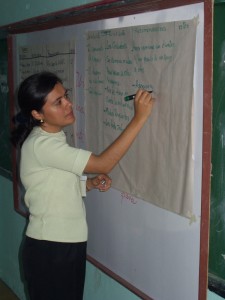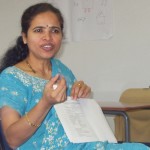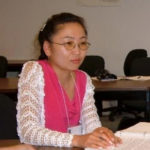Associate Consultants are a vital part of IDEAS Team
 As you will see in this website, we have a wide variety of services and have worked on four continents. From the listing of our clients, you also will see the variety of skills that are needed. Throughout long history, most of our personnel have been associate consultants. The majority are part-time so that they fit it around the schedule of their other commitments and work. Many work from their home office. Some work a few years while we have had several that have enjoyed working with us so much that several have worked for 20 or even 30 years.
As you will see in this website, we have a wide variety of services and have worked on four continents. From the listing of our clients, you also will see the variety of skills that are needed. Throughout long history, most of our personnel have been associate consultants. The majority are part-time so that they fit it around the schedule of their other commitments and work. Many work from their home office. Some work a few years while we have had several that have enjoyed working with us so much that several have worked for 20 or even 30 years.
By design, 75% of our IDEAS Consultants and Trainers are citizens of developing countries. 60% have been from Latin America and 40% have been from Africa and Asia. Our preference is that least 65% are women. One of IDEAS’ objectives is to build additional capacity of these skilled persons in training and technical assistance. By having a variety, IDEAS provides our clients with consultants who are native to the region, speak the local language, know the culture and issues, and are up-to-date with economic development in the region where they work.
At this time we are especially seeking consultants in the fields of impact investing and impact evaluation.
If you have skills in one of the areas in our multitude of services that are described on this website and are interested in exploring being an Associate Consultant, please send a cover letter, a Curriculum Vitae, and a list of the consulting work that you have done. Send it to getinvolved@ideasnet.org and write in the email subject line “Want to be an associate consultant”
People grow in their skills as Associate Consultants as they work with IDEAS internationally.
Here are examples two of our Associate Consultants who later became staff.
From Associate Consultant to worldwide IDEAS staff supervising others
 Dr. Puneetha Palakurthi came from her native India to teach at Southern New Hampshire University. With her doctorate in agriculture and a deep commitment to teaching practitioners, she soon joined the IDEAS team as an Associate Consultant. Puneetha taught practitioners in South Africa. She did impact assessment for CARD and CEV in the Philippines. She designed the global impact monitoring system for Trickle Up as well as doing a variety of consulting work in India and other Asian countries. She became an IDEAS staff member, managing the New Hampshire office and supervised many interns and other Associate Consultants. Puneetha and Carter led a complex and lengthy impact evaluation in Ethiopia with ACSI, then the second largest microfinance institution in Africa with nearly 750,000 clients.
Dr. Puneetha Palakurthi came from her native India to teach at Southern New Hampshire University. With her doctorate in agriculture and a deep commitment to teaching practitioners, she soon joined the IDEAS team as an Associate Consultant. Puneetha taught practitioners in South Africa. She did impact assessment for CARD and CEV in the Philippines. She designed the global impact monitoring system for Trickle Up as well as doing a variety of consulting work in India and other Asian countries. She became an IDEAS staff member, managing the New Hampshire office and supervised many interns and other Associate Consultants. Puneetha and Carter led a complex and lengthy impact evaluation in Ethiopia with ACSI, then the second largest microfinance institution in Africa with nearly 750,000 clients.
From a student to an Associate Consultant and then full-time IDEAS staff
 Dr. Gaamaa Hisigsuren. A good example of this capacity development that we seek is Gaamaa Hisigsuren, who was a microfinance practitioner in Mongolia when Carter Garber trained a leader in her organization in the Microenterprise Development Institute, which he had founded at Southern New Hampshire University. She heard about the university from the leader who returned from the course and enrolled as a Ph.D. student in community economic development there. The next year, Carter met her and learned of her interest in impact evaluation. He invited her to lead a session in his course that she was taking from him. She then was so stimulated that she applied for a research grant and went to India and did qualitative research with two of the tools Carter had taught her. Carter invited her to be a co-instructor with him and one of her graduate professors from India, Dr. Puneetha Palakurthi. Gaamaa became an IDEAS Associate Consultant. Carter then invited Gaamaa to go with him to Ghana to lead a Team using the AIMS-SEEP quantitative tools. She succeeded well in leading the Team of persons who had come from Ghana and nine other African countries. Later, Gaamaa joined three other IDEAS Team members taught the impact evaluation course together to microfinance practitioners from the Middle East, Africa, and Central Asia. Then Carter invited Gaamaa to learn the MicroSave-Africa tools for market research for which he had become a trainer. Carter trained her field use of the new tools with credit union clients in Jamaica. With each step, Gaamaa is learning how to be a better researcher, teacher and consultant to microfinance institutions in countries far from her native Mongolia. Finally, she joined the IDEAS team as a full-time employee working on a variety of work with IDEAS from Mongolia to New Jersey.
Dr. Gaamaa Hisigsuren. A good example of this capacity development that we seek is Gaamaa Hisigsuren, who was a microfinance practitioner in Mongolia when Carter Garber trained a leader in her organization in the Microenterprise Development Institute, which he had founded at Southern New Hampshire University. She heard about the university from the leader who returned from the course and enrolled as a Ph.D. student in community economic development there. The next year, Carter met her and learned of her interest in impact evaluation. He invited her to lead a session in his course that she was taking from him. She then was so stimulated that she applied for a research grant and went to India and did qualitative research with two of the tools Carter had taught her. Carter invited her to be a co-instructor with him and one of her graduate professors from India, Dr. Puneetha Palakurthi. Gaamaa became an IDEAS Associate Consultant. Carter then invited Gaamaa to go with him to Ghana to lead a Team using the AIMS-SEEP quantitative tools. She succeeded well in leading the Team of persons who had come from Ghana and nine other African countries. Later, Gaamaa joined three other IDEAS Team members taught the impact evaluation course together to microfinance practitioners from the Middle East, Africa, and Central Asia. Then Carter invited Gaamaa to learn the MicroSave-Africa tools for market research for which he had become a trainer. Carter trained her field use of the new tools with credit union clients in Jamaica. With each step, Gaamaa is learning how to be a better researcher, teacher and consultant to microfinance institutions in countries far from her native Mongolia. Finally, she joined the IDEAS team as a full-time employee working on a variety of work with IDEAS from Mongolia to New Jersey.

 Español
Español